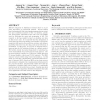Free Online Productivity Tools
i2Speak
i2Symbol
i2OCR
iTex2Img
iWeb2Print
iWeb2Shot
i2Type
iPdf2Split
iPdf2Merge
i2Bopomofo
i2Arabic
i2Style
i2Image
i2PDF
iLatex2Rtf
Sci2ools
115
click to vote
KDD
2008
ACM
2008
ACM
Heterogeneous data fusion for alzheimer's disease study
Effective diagnosis of Alzheimer's disease (AD) is of primary importance in biomedical research. Recent studies have demonstrated that neuroimaging parameters are sensitive and consistent measures of AD. In addition, genetic and demographic information have also been successfully used for detecting the onset and progression of AD. The research so far has mainly focused on studying one type of data source only. It is expected that the integration of heterogeneous data (neuroimages, demographic, and genetic measures) will improve the prediction accuracy and enhance knowledge discovery from the data, such as the detection of biomarkers. In this paper, we propose to integrate heterogeneous data for AD prediction based on a kernel method. We further extend the kernel framework for selecting features (biomarkers) from heterogeneous data sources. The proposed method is applied to a collection of MRI data from 59 normal healthy controls and 59 AD patients. The MRI data are pre-processed ...
Related Content
| Added | 30 Nov 2009 |
| Updated | 30 Nov 2009 |
| Type | Conference |
| Year | 2008 |
| Where | KDD |
| Authors | Jieping Ye, Kewei Chen, Teresa Wu, Jing Li, Zheng Zhao, Rinkal Patel, Min Bae, Ravi Janardan, Huan Liu, Gene Alexander, Eric Reiman |
Comments (0)

